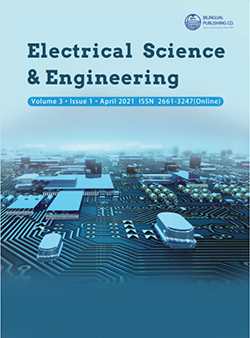-
134
-
125
-
124
-
123
-
118
Effective Bandwidth Estimation in Data Networks: An Analysis for Two Traffic Characterizations
DOI:
https://doi.org/10.30564/ese.v3i1.3368Abstract
The Generalized Markov Fluid Model (GMFM) is assumed for modeling sources in the network because it is versatile to describe the traffic
fluctuations. In order to estimate resources allocations or in other words the channel occupation of each source,the concept of effective bandwidth (EB) proposed by Kelly is used. In this paper we use an expression to determine the EB for this model which is of particular interest because it allows expressing said magnitude depending on the parameters of the model.This paper provides EB estimates for this model applying Kernel Estimation techniques in data networking.In particular we will study two differentiated cases:dispatches following a Gaussian and Exponential distribution.The performance of the proposed method is analyzed using simulated traffic traces generated by Monte Carlo Markov Chain algorithms.The estimation process worked much better in the Gaussian distribution case than in the Exponential one.
Keywords:
Effective bandwidth; Markov fluid model; Kernel estimation; Data networking; Monte Carlo Markov Chain algorithmsReferences
[1] Bavio, J.M and Marron, B.S. (2018). Properties of the Estimators for the Effective Bandwidth in a Generalized Markov Fluid Model. Open Journal of Statistics, Vol.8 No.1,pp. 69-84. DOI:https://doi.org/10.4236/ojs.2018.81006.
[2] Coudret, R., Durrieu, G., Saracco, J. (2013). Comparison of kernel density estimators with assumption on number of modes. Communications in Statistics - Simulation and Computation, Taylor & Francis, 2015, 44(1), 196-216.DOI:https://doi.org/10.1080/03610918.2013.770530.
[3] Devroye, L. (1987). An L1 asymptotically optimal kernel estimate. Technical Report, McGill Univ.
[4] Devroye, L. (1983). The equivalence of weak, strong and complete convergence in L1 for kernel density estimates.Annals of Statistics, 11, 3: 896-904.
[5] Kelly, F. (1996). Notes on effective bandwidths. Stochastics Networks: Theory and applications. Oxford University Press. Oxford. pp. 141-168. http://www.statslab.cam.ac.uk/~frank/eb.ps.
[6] Kesidis, G., Walrand, J. and Chang, C.S. (1993). Effective bandwidth for multiclass Markov fluids and other ATM sources. IEEE ACM Trans. Networking 1,4, 424-428.
[7] Pedregosa, F. et al. (2011). Scikit-learn: Machine Learning in Python, JMLR, 12, 2825-2830.
Downloads
How to Cite
Issue
Article Type
License
Copyright © 2021 José Bavio, Carina Fernández, Beatriz Marrón

This is an open access article under the Creative Commons Attribution-NonCommercial 4.0 International (CC BY-NC 4.0) License.




 José Bavio
José Bavio





